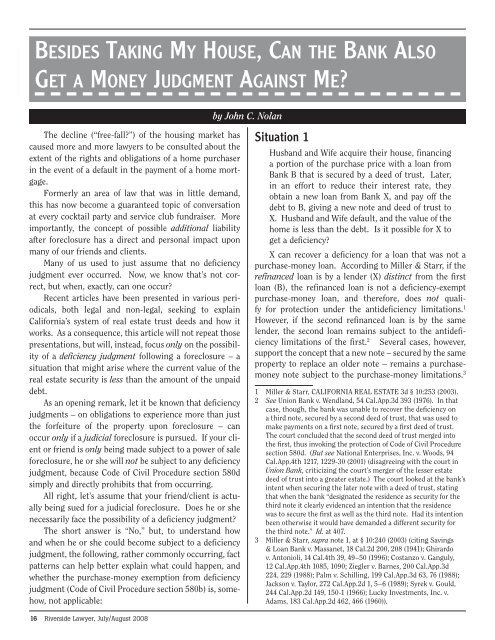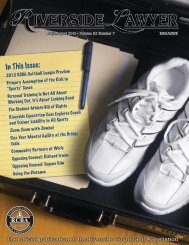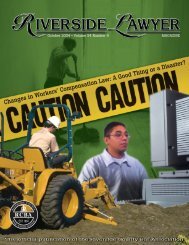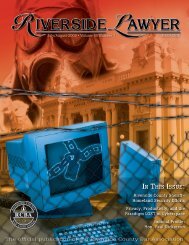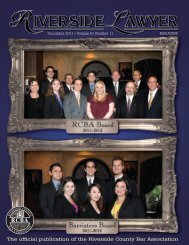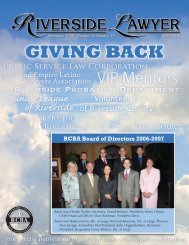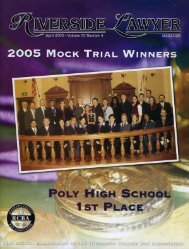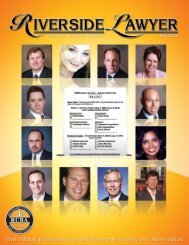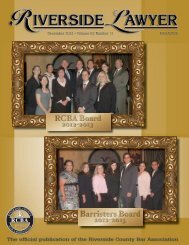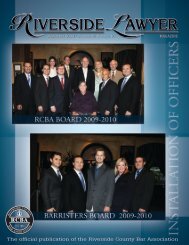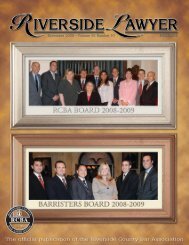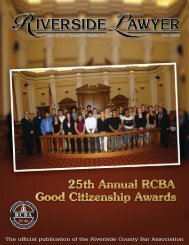IN THIS ISSUE: - Riverside County Bar Association
IN THIS ISSUE: - Riverside County Bar Association
IN THIS ISSUE: - Riverside County Bar Association
You also want an ePaper? Increase the reach of your titles
YUMPU automatically turns print PDFs into web optimized ePapers that Google loves.
Besides Taking My House, Can the Bank Also<br />
Get a Money Judgment Against Me?<br />
The decline (“free-fall?”) of the housing market has<br />
caused more and more lawyers to be consulted about the<br />
extent of the rights and obligations of a home purchaser<br />
in the event of a default in the payment of a home mortgage.<br />
Formerly an area of law that was in little demand,<br />
this has now become a guaranteed topic of conversation<br />
at every cocktail party and service club fundraiser. More<br />
importantly, the concept of possible additional liability<br />
after foreclosure has a direct and personal impact upon<br />
many of our friends and clients.<br />
Many of us used to just assume that no deficiency<br />
judgment ever occurred. Now, we know that’s not correct,<br />
but when, exactly, can one occur?<br />
Recent articles have been presented in various periodicals,<br />
both legal and non-legal, seeking to explain<br />
California’s system of real estate trust deeds and how it<br />
works. As a consequence, this article will not repeat those<br />
presentations, but will, instead, focus only on the possibility<br />
of a deficiency judgment following a foreclosure – a<br />
situation that might arise where the current value of the<br />
real estate security is less than the amount of the unpaid<br />
debt.<br />
As an opening remark, let it be known that deficiency<br />
judgments – on obligations to experience more than just<br />
the forfeiture of the property upon foreclosure – can<br />
occur only if a judicial foreclosure is pursued. If your client<br />
or friend is only being made subject to a power of sale<br />
foreclosure, he or she will not be subject to any deficiency<br />
judgment, because Code of Civil Procedure section 580d<br />
simply and directly prohibits that from occurring.<br />
All right, let’s assume that your friend/client is actually<br />
being sued for a judicial foreclosure. Does he or she<br />
necessarily face the possibility of a deficiency judgment?<br />
The short answer is “No,” but, to understand how<br />
and when he or she could become subject to a deficiency<br />
judgment, the following, rather commonly occurring, fact<br />
patterns can help better explain what could happen, and<br />
whether the purchase-money exemption from deficiency<br />
judgment (Code of Civil Procedure section 580b) is, somehow,<br />
not applicable:<br />
16 <strong>Riverside</strong> Lawyer, July/August 2008<br />
by John C. Nolan<br />
Situation 1<br />
Husband and Wife acquire their house, financing<br />
a portion of the purchase price with a loan from<br />
Bank B that is secured by a deed of trust. Later,<br />
in an effort to reduce their interest rate, they<br />
obtain a new loan from Bank X, and pay off the<br />
debt to B, giving a new note and deed of trust to<br />
X. Husband and Wife default, and the value of the<br />
home is less than the debt. Is it possible for X to<br />
get a deficiency?<br />
X can recover a deficiency for a loan that was not a<br />
purchase-money loan. According to Miller & Starr, if the<br />
refinanced loan is by a lender (X) distinct from the first<br />
loan (B), the refinanced loan is not a deficiency-exempt<br />
purchase-money loan, and therefore, does not qualify<br />
for protection under the antideficiency limitations. 1<br />
However, if the second refinanced loan is by the same<br />
lender, the second loan remains subject to the antideficiency<br />
limitations of the first. 2 Several cases, however,<br />
support the concept that a new note – secured by the same<br />
property to replace an older note – remains a purchasemoney<br />
note subject to the purchase-money limitations. 3<br />
1 Miller & Starr, CALIFORNIA REAL ESTATE 3d § 10:253 (2003).<br />
2 See Union Bank v. Wendland, 54 Cal.App.3d 393 (1976). In that<br />
case, though, the bank was unable to recover the deficiency on<br />
a third note, secured by a second deed of trust, that was used to<br />
make payments on a first note, secured by a first deed of trust.<br />
The court concluded that the second deed of trust merged into<br />
the first, thus invoking the protection of Code of Civil Procedure<br />
section 580d. (But see National Enterprises, Inc. v. Woods, 94<br />
Cal.App.4th 1217, 1229-30 (2001) (disagreeing with the court in<br />
Union Bank, criticizing the court’s merger of the lesser estate<br />
deed of trust into a greater estate.) The court looked at the bank’s<br />
intent when securing the later note with a deed of trust, stating<br />
that when the bank “designated the residence as security for the<br />
third note it clearly evidenced an intention that the residence<br />
was to secure the first as well as the third note. Had its intention<br />
been otherwise it would have demanded a different security for<br />
the third note.” Id. at 407.<br />
3 Miller & Starr, supra note 1, at § 10:240 (2003) (citing Savings<br />
& Loan Bank v. Massanet, 18 Cal.2d 200, 208 (1941); Ghirardo<br />
v. Antonioli, 14 Cal.4th 39, 49–50 (1996); Costanzo v. Ganguly,<br />
12 Cal.App.4th 1085, 1090; Ziegler v. <strong>Bar</strong>nes, 200 Cal.App.3d<br />
224, 229 (1988); Palm v. Schilling, 199 Cal.App.3d 63, 76 (1988);<br />
Jackson v. Taylor, 272 Cal.App.2d 1, 5–6 (1989); Syrek v. Gould,<br />
244 Cal.App.2d 149, 150-1 (1966); Lucky Investments, Inc. v.<br />
Adams, 183 Cal.App.2d 462, 466 (1960)).


